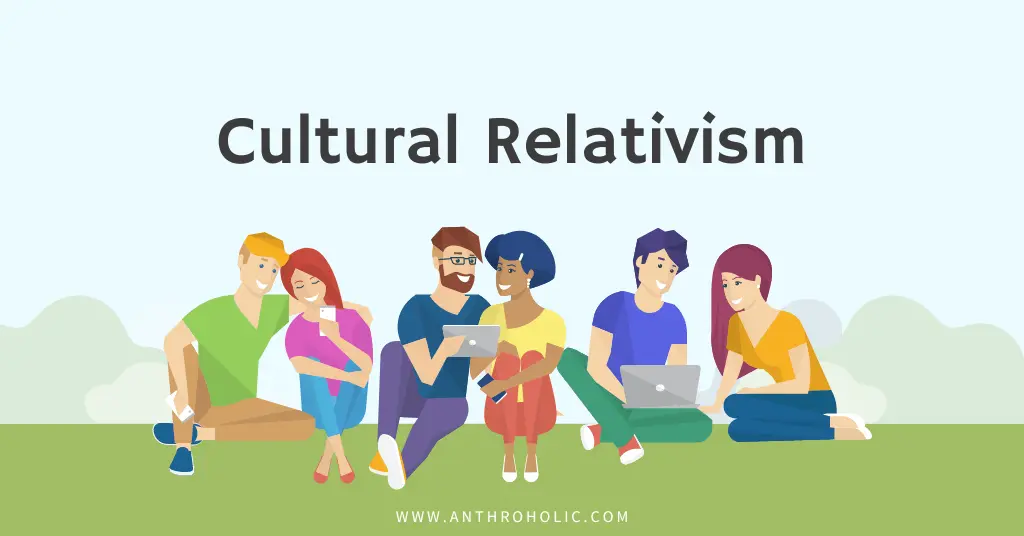AI Answer Evaluation Platform Live Now. Try Free Answer Evaluation Now
Cultural Relativism
The idea of cultural relativism has developed as a key foundation for comprehending and appreciating this diversity in the enormous span of human society, with its dynamic and varied cultures. At its core, cultural relativism rejects categorizing cultures or imposing one’s own cultural norms on another, contending that all cultural systems have inherent value and validity in their unique settings [1]. According to the theory of cultural relativism, our moral standards and social norms are products of our society; they are neither absolute nor universal. Therefore, it is important to understand others within their cultural context rather than passing judgment on them based on one’s own cultural norms [2]. In essence, cultural relativism invites us to don different cultural lenses to see the world as others do.

Historical Background
In the late 19th and early 20th centuries, anthropologists began to objectively examine cultural differences, sowing the seeds of cultural relativism inside the discipline. Anthropologist Franz Boas, a leading figure, rejected the predominantly ethnocentric and evolutionist viewpoints of his time. He maintained that cultural practices were influenced by specific historical and environmental situations rather than being fundamentally superior or inferior [3]. The development of cultural relativism was further fueled by the works of Boas’ students, including Ruth Benedict and Margaret Mead, whose extensive fieldwork in different cultures illustrated the immense variety and complexity of human life [4, 5]. They reinforced that our perceptions, values, and practices are significantly influenced by our cultures, and these findings catalyzed the widespread acceptance of cultural relativism. Consider, for instance, how Western and Eastern cultures view aging differently. Many Western civilizations place a strong focus on youth, which results in a frequently unfavorable attitude of aging. In contrast, many Eastern cultures venerate the old and see them as a source of knowledge and experience [6]. Judging either of these attitudes as superior would demonstrate ethnocentrism, whereas cultural relativism would require understanding these differing perceptions within their cultural contexts.
Theoretical Foundations of Cultural Relativism
Cultural relativism’s philosophical foundations are based on the dynamic interaction of a number of theories, including ethical relativism, moral judgment, and anthropological viewpoints.
Firstly, let’s draw a distinction between ethical relativism and cultural relativism, as the interplay between these concepts often causes confusion. Ethical relativism posits that moral rights and wrongs are not absolute but vary among cultures [7]. In contrast, cultural relativism is an anthropological principle that dictates understanding cultures within their unique contexts, a method, not a moral position [2]. Ethical relativism may be seen as a subset of cultural relativism, the latter encompassing broader societal norms and practices.
The moral foundations of cultural relativism hold that no culture’s ethical claims are innately superior to any other’s, given that they are shaped by unique histories, environments, and belief systems [8]. For instance, Western norms frequently denounce female circumcision as barbaric even though it is considered a rite of passage in several African tribes. However, a cultural relativist perspective would forbid doing so before comprehending the practice’s cultural importance [9].
Anthropological theories provide robust support for cultural relativism. Boasian anthropology rejected the ethnocentric bias and argued for a holistic, empathetic understanding of different cultures [3]. Later, the interpretive anthropology of Clifford Geertz advocated for ‘thick description,’ a deep, contextual understanding of cultural phenomena [10]. These theories buttress cultural relativism by endorsing a non-judgmental, in-depth exploration of cultural differences.
A theory like cultural materialism provides another angle. Marvin Harris, its founder, asserted that a society’s material conditions, including technology and environment, fundamentally shape its culture [11]. This reinforces cultural relativism by emphasizing the role of context in shaping a culture’s norms and practices.
The essence of cultural relativism thus rests on a foundation of ethical theory, moral reasoning, and anthropological principles. It’s not merely a perspective but a rigorous approach to understanding the human experience in its infinite variety.
Key Principles of Cultural Relativism
The concept of cultural relativism, a linchpin in anthropology, is anchored by several key principles that illuminate the human capacity for cultural diversity and foster a respectful, non-judgmental approach to understanding it.
First off, the core of cultural relativism is cultural diversity and plurality. This principle states that no one culture may make claims to universal applicability or superiority while acknowledging the enormous diversity of human cultures [2]. The Toda people of South India, for example, follow a unique matrilineal system and intricate dairy ritual practices, which may seem alien to many, but are perfectly valid in their cultural context [12].
Secondly, cultural context is crucial in deciphering meaning. Practices or norms cannot be understood in isolation from their cultural contexts, as they derive their significance from these contexts [10]. In the Japanese context, the art of gift-giving, or “omiyage”, is deeply rooted in social obligation and reciprocal respect, a nuance lost without a thorough understanding of the culture [13].
Thirdly, cultural relativism espouses a value-neutral and non-judgmental stance. The role of the anthropologist is not to pass judgment but to comprehend and convey cultural realities [14]. We can consider the practice of polyandry in Tibetan societies, which might be deemed unconventional by many cultures, but holds a crucial socio-economic role in their high-altitude environment [15].
Lastly, the principle of understanding cultural practices within their own framework insists that cultural phenomena be evaluated on their terms, rather than those of the observer [16]. For instance, the Trobriand Islanders’ Kula ring, a ceremonial exchange system, might seem inefficient from a Western economic perspective, but it fosters social bonds and status, invaluable in their societal context [17]. By adhering to these principles, cultural relativism offers a more nuanced, empathetic view of our shared human experience, promoting respect and understanding amidst the diversity.
Application of Cultural Relativism in Anthropological Research
The field of anthropological inquiry is where cultural relativism manifests itself most practically. Through its lens, we can see cultural occurrences in their whole, free from prejudice and ethnocentric viewpoints.
The main techniques used in anthropological study, ethnographic methodologies, are influenced by cultural relativism. Long-term, immersion fieldwork is required for ethnography in order to gain a thorough grasp of cultural practices in their native environments [10]. Ethnographers adopting a cultural relativist perspective strive to gain an ‘insider’s view’ of the culture, eschewing ethnocentric judgments and recognizing the inherent validity of cultural norms.
The application of cultural relativism can be illustrated through case studies. For instance, Margaret Mead’s seminal study in Samoa applied cultural relativism to understand adolescent behavior, revealing significant differences from Western adolescence and challenging previously held universal notions [5]. Similarly, Richard Lee’s work among the Ju/’hoansi of the Kalahari Desert illuminated their intricate food-sharing customs and egalitarian ethos, resisting the Western stereotype of ‘primitive’ hunter-gatherer societies [18].
However, applying cultural relativism in research invokes several ethical considerations. While promoting understanding and tolerance, cultural relativism must not become a shield for harmful practices within cultures. Respecting cultural differences shouldn’t impede our commitment to universal human rights [19]. Ethnographers must tread this fine line, maintaining a culturally sensitive yet ethically vigilant stance.
Cultural Relativism in Contemporary Society
The cultural relativism tenets play a crucial role in navigating cross-cultural encounters, guiding policymaking, and advancing multiculturalism in the constantly globalizing tapestry of contemporary society.
Firstly, in the context of multiculturalism, cultural relativism fosters mutual respect and coexistence in an increasingly globalized world. It dissuades us from imposing our cultural norms onto others, instead encouraging us to appreciate the rich diversity of human experience [20]. For instance, the culturally diverse society of Canada has incorporated cultural relativism into its multiculturalism policy, promoting cultural tolerance and social cohesion [21]
Secondly, cultural relativism influences legal systems and policy-making. Recognizing cultural specificity can lead to more equitable and contextually appropriate policies. Indigenous rights, for instance, have been increasingly recognized within international legal frameworks, with cultural relativism playing a crucial role in such progress [22].
Furthermore, cultural relativism has significant implications for education. It encourages curricula that represent diverse cultural perspectives, fostering intercultural understanding and respect [23]. In this vein, Finland’s education system, renowned globally for its effectiveness, includes intercultural education in its curricula, promoting cultural relativism and equipping students to thrive in a multicultural world [24].
Ultimately, cultural relativism in our contemporary society serves as a potent tool for managing the complexities and nuances of multicultural interactions. It informs policies that respect cultural specificity, and educates future generations about the beautiful diversity of human cultures, fostering a more tolerant and harmonious global society.
Challenges and Limitations of Cultural Relativism
Despite the importance of cultural relativism in fostering understanding and respect among diverse cultures, it is not without its critiques and limitations. Navigating the complexities of cultural practices, ethical norms, and the dynamic currents of social progress pose significant challenges to the framework.
Critiques of cultural relativism often stem from its potential to overlook or even validate harmful practices. For instance, consider the debate around ‘sati’, an ancient practice in some Indian societies where a widow self-immolates on her husband’s pyre [25]. While rare and illegal today, a cultural relativist lens might historically have been accused of overlooking the inherent gender inequality and human rights violations under the guise of cultural specificity.
Further complexity arises in the intersection of cultural practices and ethical values. An instance of this conflict is found in the Inuit tradition of hunting seals, a cultural necessity and long-standing tradition [26]. However, this practice clashes with Western animal rights movements, creating tension between cultural respect and ethical considerations [27]
Cultural relativism also faces scrutiny regarding its implications for social progress. Critics argue that by asserting the equal validity of all cultures, cultural relativism may inadvertently inhibit progress, holding societies to their traditional practices and hindering evolution towards universal human rights [28]. However, supporters counter that change must be culturally informed and internally driven, to avoid the pitfalls of ethnocentrism and cultural imperialism [29].
Despite these challenges, cultural relativism remains a powerful tool for navigating our diverse global society. It encourages us to critically engage with cultural practices, to strive for a balance between cultural respect and universal ethical values, and to promote social progress that respects cultural diversity.
Debates and Future Directions in Cultural Relativism
The notion of cultural relativism is still an intriguing subject for discussion as the twenty-first century progresses and continues to influence developments in anthropology and other fields. Key topics in these debates include the interaction of universal ethics, ethical conundrums, the impact of technology, and globalization.
Revisiting the concept of universal ethics is a primary debate within cultural relativism. The Universal Declaration of Human Rights, adopted by the United Nations in 1948, offers a global standard for ethical norms, however, it has been critiqued for potentially imposing Western ethical norms on diverse cultures [19]. Anthropologists continue to grapple with how to reconcile cultural relativism with the pursuit of universal human rights.
Cultural relativism is at the core of many ethical dilemmas. For example, the controversial practice of headhunting among the Ilongot of the Philippines, though largely abandoned, posed significant ethical challenges for anthropologists studying the community [30]. Balancing respect for cultural traditions with condemnation of violence is a profound ethical conundrum at the heart of cultural relativism.
In an era marked by rapid technological progress and globalization, cultural relativism takes on new dimensions. As digital cultures evolve, our understanding of cultural practices must also adapt. For instance, the role of social media in shaping cultural norms and identities presents new frontiers for culturally relativistic analysis [31].
In conclusion, while cultural relativism remains a foundational principle in anthropology, it continues to evolve and adapt to the changing global landscape. As we navigate these complexities, cultural relativism remains an essential tool in fostering mutual understanding and respect among the diverse cultures that form the fabric of our global society.
Conclusion
The compass for anthropological study, cultural relativism, offers a profound grasp of cultural variation and complexity. We have uncovered the theoretical underpinnings, guiding principles, applications, difficulties, discussions, and future directions of this trip as we have reflected on it. The complex fabric of cultural relativism is made up of several strands that have been meticulously stitched together.
This idea places an emphasis on cultural diversity, encourages us to view cultures within their own contexts, and promotes a value-neutral and non-judgmental mindset. It has served as the foundation for ethnographic methodologies, directing anthropologists throughout their fieldwork, creating multicultural understanding in our increasingly globalized society, and fostering a profound understanding of cultural practises within their particular setting.
Nevertheless, there are several difficulties with cultural relativism. It has endured criticism for allegedly ignoring detrimental behaviors, impeding social advancement, and conflicting with fundamental human rights. The delicate balance between respecting cultural diversity and preserving human rights must be addressed in order to address these problems, which call for continual discussion and reflection. As we look to the future, several areas warrant further research. The interaction of cultural relativism and digital cultures, its role in crafting culturally informed policies, and the reconciliation of cultural practices with universal ethical norms are some key domains for future inquiry.
Cultural relativism is changing in the globalized and technologically advanced day. Its importance in comprehending the effects of digital cultures and how they interact with traditional practices opens up new horizons for research. Moreover, the intensifying cross-cultural exchanges in this globalized world underscore its relevance.
A crucial waypoint for navigating our global society is cultural relativism, which recognises and celebrates cultural difference. It calls on us to continue to be respectful, open-minded, and inquisitive in our cross-cultural interactions and to embrace diversity as evidence of the complex character of human existence. The depth and complexity of human cultures will be revealed as we move forward, and cultural relativism will continue to illuminate our way, pointing us in the direction of a more accepting and understanding society.
References
1. Barnard, A. (2000). History and Theory in Anthropology. Cambridge University Press. https://fpa2014.files.wordpress.com/2014/07/barnard-historytheoryanthropology.pdf
2. Herskovits, M. J. (1972). Cultural Relativism: Perspectives in Cultural Pluralism. Vintage.
3. Stocking, G. W. (1968). Race, Culture, and Evolution: Essays in the history of anthropology. Free Press.
4. Benedict, R. (1934). Patterns of Culture. Houghton Mifflin.
5. Mead, M. (1928). Coming of Age in Samoa. William Morrow & Co.
6. Gire, J. T. (2014). How death imitates life: cultural influences on conceptions of death and dying. Online Readings in Psychology and Culture, 6(2).
7. Rachels, J., & Rachels, S. (2010). The Elements of Moral Philosophy. McGraw-Hill.
8. Geertz, C. (1984). “Anti Anti-Relativism.” American Anthropologist, 86(2), 263-278.
9. Shell-Duncan, B., & Hernlund, Y. (Eds.). (2000). Female “Circumcision” in Africa: Culture, Controversy, and Change. Lynne Rienner Publishers.
10. Geertz, C. (1973). The Interpretation of Cultures. Basic Books.
11. Harris, M. (1979). Cultural Materialism. Random House.
12. Emeneau, M. B. (1955). Studies in the Folk-Tales of the Todas. Journal of American Folklore, 68(269), 345-351.
13. Befu, H. (1977). Social Exchange. Annual Review of Anthropology, 6, 255-281.
14. Boas, F. (1920). The Methods of Ethnology. American Anthropologist, 22(4), 311-322.
15. Goldstein, M. (1971). Pahari and Tibetan Polyandry Revisited. Ethnology, 10(3), 302-317.
16. LeVine, R. A. (2001). Culture and Personality Studies, 1918-1960: Myth and History. Journal of Personality, 69(6), 803-818.
17. Malinowski, B. (1922). Argonauts of the Western Pacific. Routledge.
18. Lee, R. B. (1979). The !Kung San: Men, Women and Work in a Foraging Society. Cambridge University Press.
19. Donnelly, J. (1984). Cultural Relativism and Universal Human Rights. Human Rights Quarterly, 6(4), 400-419.
20. Kymlicka, W. (1995). Multicultural Citizenship: A Liberal Theory of Minority Rights. Oxford University Press.
21. Banting, K., & Kymlicka, W. (2017). The Multicultural Welfare State: International Experience and North American Narratives. Social Canada Foundation.
22. Anaya, S. J. (2004). Indigenous Peoples in International Law. Oxford University Press.
23. Banks, J. A. (2004). Diversity and Citizenship Education: Global Perspectives. Jossey-Bass.
24. Jokikokko, K. (2010). The Same and Other – An Intercultural Study of Teacher Identity. Acta Universitatis Ouluensis.
25. Hawley, J. S. (1994). Sati, the Blessing and the Curse: The Burning of Wives in India. Oxford University Press.
26. Wenzel, G. W. (1991). Animal Rights, Human Rights: Ecology, Economy, and Ideology in the Canadian Arctic. University of Toronto Press.
27. Singer, P. (1975). Animal Liberation: A New Ethics for Our Treatment of Animals. New York Review/Random House.
28. Appiah, K. A. (2005). The Ethics of Identity. Princeton University Press.
29. Nanda, S. (1999). Cultural Relativism. In L. Nader (Ed.), The Blackwell Companion to Law and Society. Blackwell.
30. Rosaldo, R. (1980). Ilongot Headhunting, 1883-1974: A Study in Society and History. Stanford University Press.
31. Boyd, D. (2014). It’s Complicated: The Social Lives of Networked Teens. Yale University Press.




